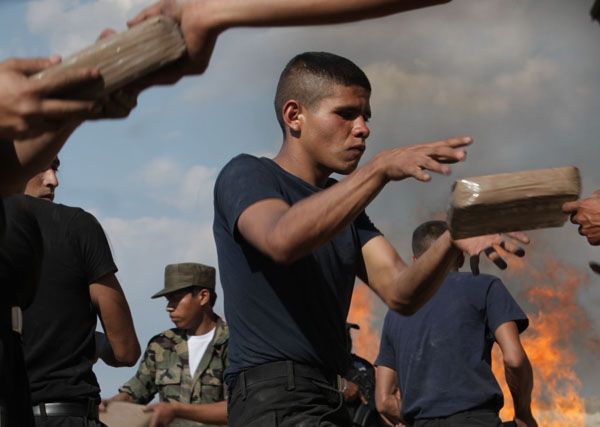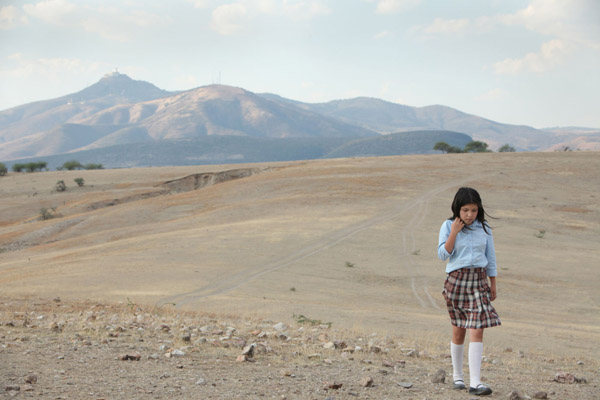“Mexican director Amat Escalante has come to specialize in startling, borderline-surreal scenarios of brutality, but his third feature Heli—following 2008’s US-set Los Bastardos—is all the more distressing for being drawn from headline reality,” begins Jonathan Romney in Screen. “Set against the background of Mexico’s current drug wars, Heli is about innocents drawn by chance into the inferno of narco killing. Stylistically a slow-burner, Heli is nevertheless remorselessly confrontational, observing violence unflinchingly and—many viewers will feel—in barely tolerable detail. While the film is deeply realistic at base, Escalante’s stylistic mix of long takes, elliptical editing and unexpected camera moves pushes it into the realm of bad dream.”
“A forbiddingly brutal prologue sets the scene and the tone,” writes Neil Young, “casting ominous shadows over the ensuing scenes that depict the fumblingly tender but clearly ‘unsuitable’ romance between pubescent high-schooler Estela (baby-faced Andrea Vergara) and her 17-year-old boyfriend, a thuggish special-forces police-cadet. The love-birds’ elopement plans, involving the purloinment of cop-confiscated drugs, go catastrophically awry with horrendous consequences for all. As with his previous picture The Bastards, director Escalante serves up gruelingly nasty sequences—his piece-de-resistance here involves flambéed male genitalia—with a detachment that’s also somehow mildly gloating. But as an atmospherically dystopic indictment of how the ‘war’ on drugs has had a devastating effect south of la frontera, Heli—named after Estela’s brother, the ordinary working Joe who becomes an unlikely angel of vengeance—is clear-eyed and persuasive.”
“Heli executes its shocks with sleek, gasp-inducing effectiveness, but neither it politics, nor its shifts in physical perspective, ever surprise or disorientate us,” writes Guy Lodge at In Contention. “That’s not something you could say about even the weakest work of Escalante’s friend and producer Carlos Reygadas—to whom he’s obviously in thrall, not least in the film’s oddly shoehorned-in stabs of nutso humor and anti-charismatic non-professional cast…. All sandy surfaces and doomy lilac clouds, Heli could hardly be more pristinely framed and lit by cinematographer Lorenzo Hagerman, but its glassiness is a cop-out, objectifying characters that are already objects in a rigid moral composition. Supremely accomplished and subtextually tidy, Heli leaves us, even at its ugliest, comfortably numb.”
“Heli is undoubtedly made with serious intent, but it is also relentlessly depressing and curiously uninvolving,” finds Stephen Dalton in the Hollywood Reporter. “The cinematic lineage here is less Bresson or Reygadas than Michael Haneke circa Funny Games.”
The Telegraph‘s Robbie Collin notes that Los Bastardos “warned of the depths to which humans could sink—in that movie’s case, two Mexican day laborers working cash-in-hand jobs in Los Angeles—when they come to resent the society into which they fit. His new work acts as an equally tough but perversely positive riposte to that earlier picture: surround yourself with the right people, it suggests, and those people will see you right.”
Updates: Escalante “plunges us deep into Mexico’s vicious cycle of drug-fueled violence, with no end—or much of a discernable point—in sight,” writes Variety‘s Scott Foundas. Heli is “the most explicit, realistically violent film to premiere on Cannes’ main stage since Brillante Mendoza’s controversial Kinatay (which ended up winning the fest’s directing prize in 2009)…. While there can be no faulting the filmmaker’s sincerity in wanting to cinematically render the chaos wrought on his country by poverty and the drug wars, much of what Heli has to say feels either obvious and/or exhausted by a raft of other recent narrative and documentary features on similar subjects (including Gerardo Naranjo’s acclaimed Miss Bala and the Sundance hit Narco Cultura). Even Escalante’s own two previous Cannes-premiered features… proffered similar portraits of violent despair on both sides of the border, adding to the feeling that this clearly talented helmer has gone to this particular well one too many times.”
“Escalante, it seems, wants all of his characters unvarnished, which is admirable, but it comes at the expense of making a movie that while eye-opening, doesn’t emotionally resonate,” finds the Playlist‘s Kevin Jagernauth.
At Cineuropa, Fabien Lemercier suggests that “the film also gives much food for thought about the influence of images (TV, games) in a country where criminal chaos with invisible boundaries rules government departments, poisoning minds and giving the most mundane life a flavor of survival on the brink of hell.”
“As accomplished as it is horrific, Heli contains multiple images of shocking cruelty, of which the already notorious penis-burning scene is only the most prolonged,” writes Michał Oleszczyk at RogerEbert.com. “Still, I would make a case for the movie as a serious work, since restraint is as crucial to the director’s concept as the graphic violence. Instead of locking the viewer in a torture chamber the way Saw franchise does, the film actually explores the psychic cost of violence in detail and gives some hint of a possible rebirth at the end.”
“Heli is the kind of story that a director like Martin Scorsese could probably tell with three single shots,” writes David Jenkins in Little White Lies. “It’d probably be overselling Escalante’s inexorable, hyperviolent hellride to say that the devil here is in the detail, as it’s a film that’s so bereft of any kind of hope, justice or empathy that it’s hard not take the director’s posturing sense of nihilism as some kind of sick joke.”
For Time Out‘s Dave Calhoun, “what threatens to descend into an arthouse horror show of physical indignity piled on to psychological torture in the end becomes something more sad, sombre and even, in a crooked way, oddly reassuring…. What makes Heli more interesting than just a stark picture of a community in a mess are its nuanced suggestions of how evil at the top seeps down to corrupt at the lowest levels of society. Small mistakes can kickstart events which are horrific when there’s no moral or institutional certainty to rely on. There’s also a strong strain of empathy running through the film and even a last-minute reminder of how families can endure the most terrible events.”
“Heli is quite impressive formally and rhythmically,” writes Mike D’Angelo at the AV Club, “but it’s dispiriting to see such talent squandered on a narrative that’s neither entertaining nor in any way illuminating, that seems to have no purpose except to rub our noses in the nastiest fecal matter Escalante can imagine. Do things like this really happen to ordinary, innocent Mexicans? Sadly, yes, but that doesn’t automatically make them worthy of our attention, at least in a dramatic context. Catharsis requires something more.”
“Escalante’s aesthetic is pure Film Fest 101,” writes Keith Uhlich for Time Out New York, “from the static shots of desolate landscapes that seem at once self-serious and parodic to the unflinching portrayals of violence that don’t illuminate the story’s theme (in this case, the barbarous machismo and pernicious crookedness inherent to modern-day Mexico) so much as deaden a viewer’s senses with their torture-porn nihilism.”
Heli is “a damning indictment of contemporary Mexico, capturing its institutionalized corruption, its endemic cruelty,” writes the Guardian‘s Catherine Shoard. “What makes it palatable are the grace notes: a cowboy with the curliest boots in the world, a Ray Cooney-ish reveal from a lady cop, a scene in which Beto proves his machismo to Estela by bench-pressing her. Squint, and the title makes more sense. Shut your eyes entirely to its horrors and you’ll really miss out.”
Updates, 5/17: For the New York Times‘ Manohla Dargis, Heli is “one of those exploitation films that sells its violent goods with art cinema pretension.” Escalante “manages only to offer up one gory reminder after another of how easily filmmakers can lose control of screen violence.”
Meantime, right here in Keyframe, Anna Tatarska talks with Escalante, not only about Heli, but also about Sangre and Los Bastardos.
Escalante is “striving for emotional meaning rather than just scoring points off our discomfort,” writes the Voice‘s Stephanie Zacharek, “and that makes all the difference. The despair and desperation of the movie’s young protagonist (played by Armando Espitia) are believably human responses to horrific events, and Escalante keeps that in focus.”
Update, 5/18: The Film Society of Lincoln Center’s Eugene Hernandez talks with Escalante about how seeing Slacker drew him to Austin, where he fell under the influence of James Benning’s Landscape Suicide.
Tim Grierson for Paste: “With its wide-open skies and desolate, barren terrain, the environment of Heli could almost resemble a stoic, unromantic Western, with Heli serving as the one good man trying to be virtuous in a world crumbling into chaos…. Instead of creating a societal portrait, the bone-dry Heli is a little too methodical and dispassionate for its emotional undercurrents to fully register.”
Update, 5/25: Tom Christie interviews Escalante for Thompson on Hollywood.
Update, 5/26: Escalante has won Best Director.
Cannes 2013 Index. And you can watch over 100 films that have seen their premieres in Cannes right here on Fandor. For news and tips throughout the day every day, follow @KeyframeDaily on Twitter and/or the RSS feed. Get Keyframe Daily in your inbox by signing in at fandor.com/daily.





